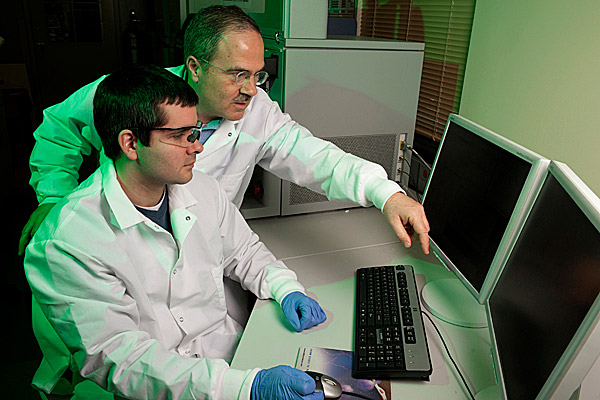Eight research projects, partners selected for first round of Bioscience CAT grants
1:57 p.m., April 17, 2012–The Delaware Biotechnology Institute and the Delaware Economic Development Office have announced eight research projects through the recently launched Delaware Bioscience Center for Advanced Technology (Bioscience CAT).
These CAT grants link researchers from Delaware academic and research institutions with local bioscience companies to create advanced technologies while investing in the bioscience community to ensure Delaware competes on the world stage in biotechnology innovation.
“These projects are addressing critical issues–ranging from cancer to alternative energies,” said Kelvin Lee, director of the Delaware Biotechnology Institute and Gore Professor of Chemical Engineering at the University of Delaware. “With these talented researchers partnering with local bioscience companies, we are hoping to see a great impact that goes beyond Delaware.”
“Under the leadership of Gov. Jack Markell, the state has made a commitment to support an innovation-driven economy,” said Alan Levin, director of the Delaware Economic Development Office. “The Bioscience Center for Advanced Technology is part of that commitment, one that nurtures the bioscience community from student scientists, to start-ups and our large multinational companies.”
The first round of CAT grant-funded projects and partners include:
- “Improving Clostridial Fermentation of Glycerol, and Integrating with ChemX Technology to Demonstrate Lowest Cost Butanol Production,” Terry Papoutsakis of the University of Delaware (lead researcher) and Dynasep, Inc. and Elcriton, Inc.
- “Markers for Asymmetric and Symmetric Colonic Stem Cell Division,” Dr. Bruce Boman of the Center for Translational Cancer Research (lead researcher) and SDIX, Inc.
- “Compatibility of Pediatric Drug Formulations,” Dr. Rob Mason of the Nemours Research Foundation/A.I. DuPont Hospital for Children (lead researcher) and Agilent Technologies.
- “Elucidation of Biological Mechanisms Leading to High or Low Feed Efficiency in Broiler Chickens,” Behnam Abasht of the University of Delaware (lead researcher) and Heritage Breeders LLC.
- “Engineering an Anaerobic, Low pH Fluorescent Protein for Use in Clostridia Cell Cultures,” Jeff Caplan of the University of Delaware (lead researcher) and Elcriton, Inc.
- “Bioinformatics Optimization for Recombinant Protein Expression for Vaccines and Therapeutics,” Cathy Wu of the University of Delaware (lead researcher) and Fraunhofer Center for Molecular Biotechnology.
- “Protein Structure Metrics for Synthetic Biologics,” Adam Marsh of the University of Delaware (lead researcher) and Evozym, Inc.
- “Recyclable Porous-SiO2 Supported Transition Metal Catalysts for Active Pharmaceutical Ingredients (APIs),” Chao Ni of the University of Delaware (lead researcher) and Wilmington PharmaTech.
Bioscience CAT was created in January to synergize the efforts among the academic and industrial community to address the technology innovation gap and promote economic development in Delaware. Each project, with an investigator at an academic or research institution in Delaware, has a business in the state providing matching resources to pursue joint research projects.
Article by Meredith Chapman
Photo by Kathy F. Atkinson

